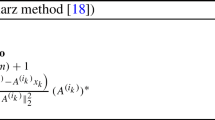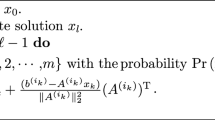Abstract
We investigate the randomized Kaczmarz method that adaptively updates the stepsize using readily available information for solving inconsistent linear systems. A novel geometric interpretation is provided which shows that the proposed method can be viewed as an orthogonal projection method in some sense. We prove that this method converges linearly in expectation to the unique minimum Euclidean norm least-squares solution of the linear system, and provide a tight upper bound for the convergence of the proposed method. Numerical experiments are also given to illustrate the theoretical results.






Similar content being viewed by others
Availability of supporting data
Data sharing not applicable to this article as no datasets were generated or analyzed during the current study. The authors confirm that all data generated or analyzed in the development of this work are adequately included or referenced in the article itself.
References
Byrne, C.: A unified treatment of some iterative algorithms in signal processing and image reconstruction. Inverse Problems 20(1), 103–120 (2003)
Patrascu, A., Necoara, I.: Nonasymptotic convergence of stochastic proximal point methods for constrained convex optimization. J. Mach. Learn. Res. 18(1), 7204–7245 (2017)
Chang, K.-W., Hsieh, C.-J., Lin, C.-J.: Coordinate descent method for large-scale l2-loss linear support vector machines. J. Mach. Learn. Res. 9(7), 1369–1398 (2008)
Olshanskii, E.E., Tyrtyshnikov, M.A.: Iterative Methods for Linear Systems: Theory and Applications. SIAM, Philadelphia, PA (2014)
Karczmarz, S.: Angenäherte auflösung von systemen linearer glei-chungen. Bull. Int. Acad. Pol. Sic. Let., Cl. Sci. Math. Nat. 355–357 (1937)
Herman, G.T., Meyer, L.B.: Algebraic reconstruction techniques can be made computationally efficient (positron emission tomography application). IEEE Trans. Medical Imaging 12(3), 600–609 (1993)
Gordon, R., Bender, R., Herman, G.T.: Algebraic reconstruction techniques (ART) for three-dimensional electron microscopy and X-ray photography. J. Theor. Biol. 29(3), 471–481 (1970)
Natterer, F.: The Mathematics of Computerized Tomography. SIAM (2001)
Feichtinger, H.G., Cenker, C., Mayer, M., Steier, H., Strohmer, T.: New variants of the POCS method using affine subspaces of finite codimension with applications to irregular sampling. In: Visual Communications and Image Processing’92, vol. 1818, pp. 299–310 (1992). SPIE
Strohmer, T., Vershynin, R.: A randomized Kaczmarz algorithm with exponential convergence. J. Fourier Anal. Appl. 15(2), 262–278 (2009)
Liu, J., Wright, S.: An accelerated randomized Kaczmarz algorithm. Math. Comp. 85(297), 153–178 (2016)
Han, D., Xie, J.: On pseudoinverse-free randomized methods for linear systems: Unified framework and acceleration. Preprint at http://arxiv.org/abs/2208.05437 (2022)
Loizou, N., Richtárik, P.: Momentum and stochastic momentum for stochastic gradient, newton, proximal point and subspace descent methods. Comput. Optim. Appl. 77(3), 653–710 (2020)
Necoara, I.: Faster randomized block Kaczmarz algorithms. SIAM J. Matrix Anal. Appl. 40(4), 1425–1452 (2019)
Needell, D., Tropp, J.A.: Paved with good intentions: analysis of a randomized block kaczmarz method. Linear Algebra Appl. 441, 199–221 (2014)
Moorman, J.D., Tu, T.K., Molitor, D., Needell, D.: Randomized Kaczmarz with averaging. BIT. 61(1), 337–359 (2021)
Gower, R.M., Richtárik, P.: Randomized iterative methods for linear systems. SIAM J. Matrix Anal. Appl. 36(4), 1660–1690 (2015)
Bai, Z.-Z., Wu, W.-T.: On greedy randomized Kaczmarz method for solving large sparse linear systems. SIAM J. Sci. Comput. 40(1), 592–606 (2018)
Gower, R.M., Molitor, D., Moorman, J., Needell, D.: On adaptive sketch-and-project for solving linear systems. SIAM J. Matrix Anal. Appl. 42(2), 954–989 (2021)
Schöpfer, F., Lorenz, D.A.: Linear convergence of the randomized sparse Kaczmarz method. Math. Program. 173(1), 509–536 (2019)
Chen, X., Qin, J.: Regularized Kaczmarz algorithms for tensor recovery. SIAM J. Imaging Sci. 14(4), 1439–1471 (2021)
Needell, D.: Randomized Kaczmarz solver for noisy linear systems. BIT. 50(2), 395–403 (2010)
Bai, Z.-Z., Wu, W.-T.: On greedy randomized augmented Kaczmarz method for solving large sparse inconsistent linear systems. SIAM J. Sci. Comput. 43(6), 3892–3911 (2021)
Censor, Y., Eggermont, P.P., Gordon, D.: Strong underrelaxation in Kaczmarz’s method for inconsistent systems. Numer. Math. 41(1), 83–92 (1983)
Hanke, M., Niethammer, W.: On the acceleration of Kaczmarz’s method for inconsistent linear systems. Linear Algebra Appl. 130, 83–98 (1990)
Zouzias, A., Freris, N.M.: Randomized extended Kaczmarz for solving least squares. SIAM J. Matrix Anal. Appl. 34(2), 773–793 (2013)
Du, K.: Tight upper bounds for the convergence of the randomized extended Kaczmarz and Gauss-Seidel algorithms. Numer. Linear Algebra Appl. 26(3), 2233 (2019)
Wu, N.-C., Xiang, H.: Semiconvergence analysis of the randomized row iterative method and its extended variants. Numer. Linear Algebra Appl. 28(1), 2334 (2021)
Needell, D., Ward, R.: Two-subspace projection method for coherent overdetermined systems. J. Fourier Anal. Appl. 19(2), 256–269 (2013)
Du, K., Sun, X.-H.: Pseudoinverse-free randomized block iterative algorithms for consistent and inconsistent linear systems. Preprint at http://arxiv.org/abs/2011.10353 (2020)
Du, K., Si, W.-T., Sun, X.-H.: Randomized extended average block Kaczmarz for solving least squares. SIAM J. Sci. Comput. 42(6), 3541–3559 (2020)
Wu, W.-T.: On two-subspace randomized extended Kaczmarz method for solving large linear least-squares problems. Numer. Algorithms 89(1), 1–31 (2022)
Wu, N.-C., Liu, C., Wang, Y., Zuo, Q.: On the extended randomized multiple row method for solving linear least-squares problems. Preprint at http://arxiv.org/abs/2210.03478 (2022)
Popa, C.: Extensions of block-projections methods with relaxation parameters to inconsistent and rank-deficient least-squares problems. BIT. 38(1), 151–176 (1998)
Popa, C.: Characterization of the solutions set of inconsistent least-squares problems by an extended Kaczmarz algorithm. Korean J. Comput. Appl. Math. 6(1), 51–64 (1999)
Bai, Z.-Z., Wu, W.-T.: On partially randomized extended Kaczmarz method for solving large sparse overdetermined inconsistent linear systems. Linear Algebra Appl. 578, 225–250 (2019)
Ma, A., Needell, D., Ramdas, A.: Convergence properties of the randomized extended Gauss-Seidel and Kaczmarz methods. SIAM J. Matrix Anal. Appl. 36(4), 1590–1604 (2015)
Leventhal, D., Lewis, A.S.: Randomized methods for linear constraints: convergence rates and conditioning. Math. Oper. Res. 35(3), 641–654 (2010)
Bai, Z.-Z., Wang, L., Wu, W.-T.: On convergence rate of the randomized Gauss-Seidel method. Linear Algebra Appl. 611, 237–252 (2021)
Golub, G.H., Van Loan, C.F.: Matrix Computations. JHU Press (2013)
Ben-Israel, A., Greville, T.N.: Generalized Inverses: Theory and Applications vol. 15. Springer (2003)
Needell, D., Srebro, N., Ward, R.: Stochastic gradient descent, weighted sampling, and the randomized Kaczmarz algorithm. Math. Program. 155, 549–573 (2016)
Steinerberger, S.: A weighted randomized Kaczmarz method for solving linear systems. Math. Comp. 90, 2815–2826 (2021)
Deren, H., Su, Y., Xie, J.: Randomized Douglas-Rachford method for linear systems: Improved accuracy and efficiency. Preprint at http://arxiv.org/abs/2207.04291 (2022)
Kolodziej, S.P., Aznaveh, M., Bullock, M., David, J., Davis, T.A., Henderson, M., Hu, Y., Sandstrom, R.: The suitesparse matrix collection website interface. J. Open Source Softw. 4(35), 1244 (2019)
Hardt, M., Recht, B., Singer, Y.: Train faster, generalize better: Stability of stochastic gradient descent. In: Proceedings of the 33rd International Conference on Machine Learning, pp. 1225–1234. PMLR (2016)
Robbins, H., Monro, S.: A stochastic approximation method. Ann. Math. Statistics. 400–407 (1951)
Ma, A., Needell, D.: Stochastic gradient descent for linear systems with missing data. Numer. Math. Theory Methods Appl. 12(1), 1–20 (2019)
Nguyen, L.M., Liu, J., Scheinberg, K., Takáč, M.: SARAH: A novel method for machine learning problems using stochastic recursive gradient. In: Proceedings of the 34th International Conference on Machine Learning, pp. 2613–2621. PMLR (2017)
Johnson, R., Zhang, T.: Accelerating stochastic gradient descent using predictive variance reduction. In: Proceedings of the Advances in Neural Information Processing Systems, pp. 315–323. (2013)
Nemirovski, A., Juditsky, A., Lan, G., Shapiro, A.: Robust stochastic approximation approach to stochastic programming. SIAM J. Optim. 19(4), 1574–1609 (2009)
Acknowledgements
We would like to thank the anonymous reviewers for their valuable comments, which have tremendously improved the content and quality of this paper.
Funding
Deren Han is supported by the NSFC grant (12131004, 11625105). Jiaxin Xie is supported by NSFC grant (12001026, 12071019,12126608) and the Fundamental Research Funds for the Central Universities.
Author information
Authors and Affiliations
Contributions
All authors contributed equally to the manuscript and read and approved the final manuscript.
Corresponding author
Ethics declarations
Ethical approval and consent to participate
Not applicable.
Conflict of interest
The authors declare no competing interests.
Additional information
Publisher's Note
Springer Nature remains neutral with regard to jurisdictional claims in published maps and institutional affiliations.
Rights and permissions
Springer Nature or its licensor (e.g. a society or other partner) holds exclusive rights to this article under a publishing agreement with the author(s) or other rightsholder(s); author self-archiving of the accepted manuscript version of this article is solely governed by the terms of such publishing agreement and applicable law.
About this article
Cite this article
Zeng, Y., Han, D., Su, Y. et al. Randomized Kaczmarz method with adaptive stepsizes for inconsistent linear systems. Numer Algor 94, 1403–1420 (2023). https://doi.org/10.1007/s11075-023-01540-x
Received:
Accepted:
Published:
Issue Date:
DOI: https://doi.org/10.1007/s11075-023-01540-x
Keywords
- System of linear equations
- Inconsistency
- Kaczmarz
- Adaptive stepsize
- Minimum Euclidean norm least-squares solution




